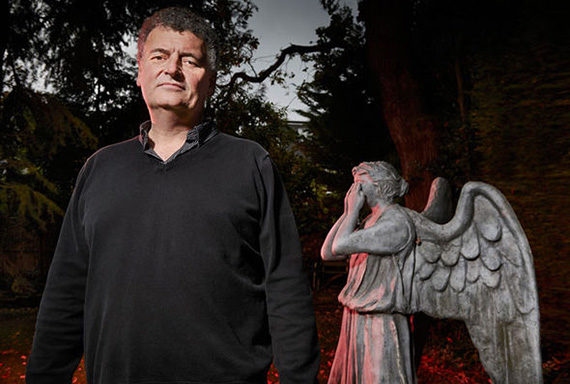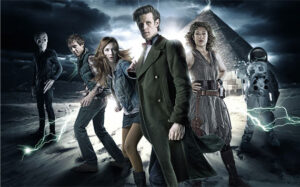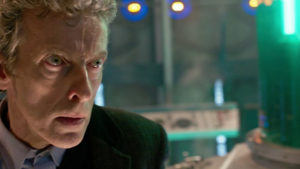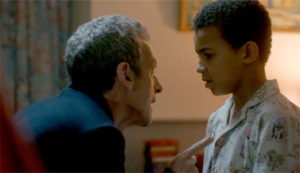Grow Up: The Moffat Era
Mark McCullough analyses how Moffat’s era has matured along with its audience, and ponders how it might end.

The shock announcement that Moffat would step down as showrunner after the next series was something I haven’t really conveyed my thoughts on yet at DWTV. This is not my first attempt at writing something on the subject matter and probably won’t be my last, however it is the first to actually be finished and not consigned to the scrapheap. In a way it’s quite telling how significant the news actually was to me that I struggled to articulate how I felt in a way that does justice to that. Love letters have been written about the amazing work that Moffat has accomplished in his role, tributes have been paid to his greatest moments, and speculation has been paramount as to what the future holds for the show. What I haven’t seen much of however (granted I have been in semi-hibernation with my current workload) is a focus on how Moffat is going to end his reign, and to me that is the thing I am most interested in.
“Oh, I always rip out the last page of a book. Then it doesn’t have to end. I hate endings.” – The Doctor – The Angels Take Manhattan
 Any writer will tell you that there is a certain element of themselves that translates itself into their work. I’ve chosen this quote from the aforementioned episode because whilst it is from the Doctor, it could easily have been said about Moffat himself. Let’s look over the evidence that could prove that Moffat doesn’t necessarily draw his stories to a full conclusion. The obvious case to present would be that of the three companions who have graced the show during the Moff’s highly successful era. Of the three, none of their final appearances (assuming that they won’t appear again at some point) have a definitive endpoint: The Ponds are free to live a full life in New York, Clara has a time machine and the ability to travel the universe, whereas River not only has her time on Delirium, but also has the augmented reality in the library. In each of these cases the endpoint is pretty fixed, for The Ponds it is their date of death, for River it was The Library, and Clara has to go back to Gallifrey eventually. For all his companions, it actually does seem as if Moffat has removed the final pages of the story.
Any writer will tell you that there is a certain element of themselves that translates itself into their work. I’ve chosen this quote from the aforementioned episode because whilst it is from the Doctor, it could easily have been said about Moffat himself. Let’s look over the evidence that could prove that Moffat doesn’t necessarily draw his stories to a full conclusion. The obvious case to present would be that of the three companions who have graced the show during the Moff’s highly successful era. Of the three, none of their final appearances (assuming that they won’t appear again at some point) have a definitive endpoint: The Ponds are free to live a full life in New York, Clara has a time machine and the ability to travel the universe, whereas River not only has her time on Delirium, but also has the augmented reality in the library. In each of these cases the endpoint is pretty fixed, for The Ponds it is their date of death, for River it was The Library, and Clara has to go back to Gallifrey eventually. For all his companions, it actually does seem as if Moffat has removed the final pages of the story.
Before I draw this section of the article to its rather optimistic conclusion, I have to address the elephant in the room with regards to my above evidence: Russell T Davies left his companion’s stories just as open ended. With that in mind, I present case two for why Moffat doesn’t like an ending: his story arcs! Now if ever there was a touchy feely subject within this fandom it is the interpretation of these arcs. Ultimately everything ties back to Gallifrey and its inevitable return to the universe proper (which would make sense to be a candidate for Moffat’s swansong). It is my opinion that there are still a lot of questions that could be doing with answering. Of course you can fashion a lot of these answers from what information we have, but they are not quite a perfect fit, and I’m not quite over the trickery in The Name of the Doctor just yet! Again I believe this shows that Moffat doesn’t like to bring anything to a full conclusion which is a positive as it leaves it open to be revisited. This in essence is why I believe that just because he is no longer showrunner does not mean he will take the RTD approach of not writing for the show again.
“We all change, when you think about it. We’re all different people all through our lives. And that’s okay, that’s good, you’ve got to keep moving, so long as you remember all the people that you used to be” – The Doctor – The Time of the Doctor
 Finding a quote to fit where I wanted to take this article next was a challenge to say the least, the regeneration quote turned out to be as good as any. In this section I’m going to cover one of my favourite aspects of the Moffat Era, but first a couple of things I want to re-iterate to you. Doctor Who is primarily a family show, and kids make up the vast majority of the target audience. By the time Moffat’s final episode airs, his era will have lasted 7 years, 8 months and 23 days, which represents a massive chunk of any child’s life. And finally Moffat himself is a parent to two children, meaning he has an excellent knowledge of how kids grow up. I’m sure you can see where I’m going with this, and those of you familiar with my previous writing for the site will remember a 10 Lessons we can learn from Doctor Who piece published last year. In light of what I’m about to cover next these lessons take on even more importance.
Finding a quote to fit where I wanted to take this article next was a challenge to say the least, the regeneration quote turned out to be as good as any. In this section I’m going to cover one of my favourite aspects of the Moffat Era, but first a couple of things I want to re-iterate to you. Doctor Who is primarily a family show, and kids make up the vast majority of the target audience. By the time Moffat’s final episode airs, his era will have lasted 7 years, 8 months and 23 days, which represents a massive chunk of any child’s life. And finally Moffat himself is a parent to two children, meaning he has an excellent knowledge of how kids grow up. I’m sure you can see where I’m going with this, and those of you familiar with my previous writing for the site will remember a 10 Lessons we can learn from Doctor Who piece published last year. In light of what I’m about to cover next these lessons take on even more importance.
At face value the Moffat Era is the story of growing up, if you strip everything else away this is the picture that remains and reveals the true arc of the era. Is it a coincidence that the era opens on a young girl and the line “Dear Santa”? In fact look at Series Five again, widely regarded as the most magical series of the show and constantly likened to a Fairy Tale. Consider this as the opening point of the analogy, a childish start point geared at the kids within the audience, yet still captivating those of all ages. A year is a long time, it really is, and the younger you are proportionally the longer it becomes. Imagine a child, you can pick any age group you want, and now imagine that you only get to see them for thirteen weeks in a year then have to wait a year to see them for another thirteen weeks. How much would they have changed in that time?
 So one year later out comes Series Six, except this time the narrative has outgrown the Fairy Tale nature of the previous one. Visually the Series is a lot less colourful and the episodes move to focus more on relationships between characters with the Series Arc following a similar course. Roll on another year and a bit into Series Seven and you get an increase in the diversity of the episodes as the show branches out into a range of genres. There is also an increase in the morality behind the episodes with dilemma such as divorce, retribution, dishonesty and sacrifice. All of this mirrors the fact that as a child grows up they begin to grasp complex issues and expand their areas of interest.
So one year later out comes Series Six, except this time the narrative has outgrown the Fairy Tale nature of the previous one. Visually the Series is a lot less colourful and the episodes move to focus more on relationships between characters with the Series Arc following a similar course. Roll on another year and a bit into Series Seven and you get an increase in the diversity of the episodes as the show branches out into a range of genres. There is also an increase in the morality behind the episodes with dilemma such as divorce, retribution, dishonesty and sacrifice. All of this mirrors the fact that as a child grows up they begin to grasp complex issues and expand their areas of interest.
 The Time of the Doctor proved to be a turning point in both characterisation and appearance of the Doctor. The change from the innocent and childish Eleventh Doctor to the moody and detached Twelfth Doctor was a remarkable one. In fact it would be impossible for anyone reading this change in light of my analogy of the Moffat era representing growing up not to liken it to a change that every person undergoes between childhood and adulthood. To liken Capaldi’s Doctor to a stereotypical pubescent teenager wouldn’t actually be that much of a stretch, although I do doubt this was the intention when the character was conceived. It is worth noting however that the regeneration did represent a change from the youngest man to play the Doctor, to one of the oldest. When I initially made the link in this paragraph I immediately dismissed it as over-analysis, but made the decision to include it anyway so as you can make up your own mind on the matter.
The Time of the Doctor proved to be a turning point in both characterisation and appearance of the Doctor. The change from the innocent and childish Eleventh Doctor to the moody and detached Twelfth Doctor was a remarkable one. In fact it would be impossible for anyone reading this change in light of my analogy of the Moffat era representing growing up not to liken it to a change that every person undergoes between childhood and adulthood. To liken Capaldi’s Doctor to a stereotypical pubescent teenager wouldn’t actually be that much of a stretch, although I do doubt this was the intention when the character was conceived. It is worth noting however that the regeneration did represent a change from the youngest man to play the Doctor, to one of the oldest. When I initially made the link in this paragraph I immediately dismissed it as over-analysis, but made the decision to include it anyway so as you can make up your own mind on the matter.
 From Series Eight onwards the show really upped its maturity as the narrative almost made a full shift to focus on emotions and relationships. Listen, one of the real highlights of the series was exclusively a study of fear and what it means. It does what it sets out to do better than anything I have seen attempt it before, and if that isn’t enough, it actually manages to put a positive spin on it. Clara’s relationships with both the Doctor and Danny form much of the character arcs of the series and there is an in depth exploration of how this effects each of the main protagonists. The finale then chooses to focus on the ‘friendship’ between the Doctor and Missy at the expense of the Cybermen aspect. This theme is carried through into Series Nine which goes even further by integrating an awareness of current affairs and the world around us into the narrative culminating in the show reaching the point of most maturity we have seen to date. The series explores risk taking and has a profound awareness that the outcomes will not always be positive in contrast to the Fairy Tale Trope of happily ever after. The ending to The Husbands of River Song acknowledges this fact in its amendment to the ‘And They Both Lived Happily Ever After’ ending. In fact this would have been a good end point for the Moffat Era as it would have effectively completed the journey of growing up and being able to face something you’ve been putting off for a long time.
From Series Eight onwards the show really upped its maturity as the narrative almost made a full shift to focus on emotions and relationships. Listen, one of the real highlights of the series was exclusively a study of fear and what it means. It does what it sets out to do better than anything I have seen attempt it before, and if that isn’t enough, it actually manages to put a positive spin on it. Clara’s relationships with both the Doctor and Danny form much of the character arcs of the series and there is an in depth exploration of how this effects each of the main protagonists. The finale then chooses to focus on the ‘friendship’ between the Doctor and Missy at the expense of the Cybermen aspect. This theme is carried through into Series Nine which goes even further by integrating an awareness of current affairs and the world around us into the narrative culminating in the show reaching the point of most maturity we have seen to date. The series explores risk taking and has a profound awareness that the outcomes will not always be positive in contrast to the Fairy Tale Trope of happily ever after. The ending to The Husbands of River Song acknowledges this fact in its amendment to the ‘And They Both Lived Happily Ever After’ ending. In fact this would have been a good end point for the Moffat Era as it would have effectively completed the journey of growing up and being able to face something you’ve been putting off for a long time.
“Or maybe there’s a bigger, scarier adventure waiting for you in there.” – The Doctor – The God Complex
 As such in order for the Moffat Era to complete its so-called journey to maturity, it is my opinion that there is only one story that it can conclude on: The Doctor’s return to Gallifrey. Yes you can argue that this has already happened in Hell Bent, but that was a Gallifrey which was long after the one teased in The Time of the Doctor. That’s the remaining gap in the story of the Moffat era, the massive universal war as the Time Lords return and the armies gathered at Trenzalore try to stop them. It certainly would be a large scale showpiece rivalling even The End of Time as a show-runner send-off celebration. That’s certainly what logic and precedent would suggest should happen. But it really shouldn’t.
As such in order for the Moffat Era to complete its so-called journey to maturity, it is my opinion that there is only one story that it can conclude on: The Doctor’s return to Gallifrey. Yes you can argue that this has already happened in Hell Bent, but that was a Gallifrey which was long after the one teased in The Time of the Doctor. That’s the remaining gap in the story of the Moffat era, the massive universal war as the Time Lords return and the armies gathered at Trenzalore try to stop them. It certainly would be a large scale showpiece rivalling even The End of Time as a show-runner send-off celebration. That’s certainly what logic and precedent would suggest should happen. But it really shouldn’t.
I have a feeling though that Moffat is going to surprise us and not pursue that line of story. For a man who likes to leave that final page blank to challenge his viewers to come up with their own solutions and to leave something for his predecessors to revisit. A book end is not what the Moffat era needs for a sense of completion. In terms of progression of the theme of growing up, of course Gallifrey would fit, and will probably form a huge element of the final series. As far as the final episode is concerned however, I feel that the kid and the fan inside Moffat will see him choose to go out on a good old fashioned romp. After all, “What’s the point in growing up if you can’t be childish sometimes”?
Conclusion
Sometimes an article doesn’t turn out how you originally planned it, and as I had said in the introduction I struggled to articulate my thoughts on Moffat leaving. It’s quite fitting then that in trying to come up with something on how I think Moffat will end his tenure, I end up stumbling on something by total accident that enhances his era for me. So I decided to keep the article exactly as it is, no redrafts or rewrites, just what popped into my head as I sat down to work on this. The only firm conclusion I can really draw is that whatever Moffat decides to go out on, as the Ninth Doctor would say, it will be “Fantastic”! One thing I would hope I am right on is the assumption that Moffat will write for the show again after stepping down, if he is considering taking the Davis’ approach however, I do feel both men should be reminded of this quote:
“You’ve decided that the universe is better off without you but the universe doesn’t agree.” – River Song – The Wedding of River Song








